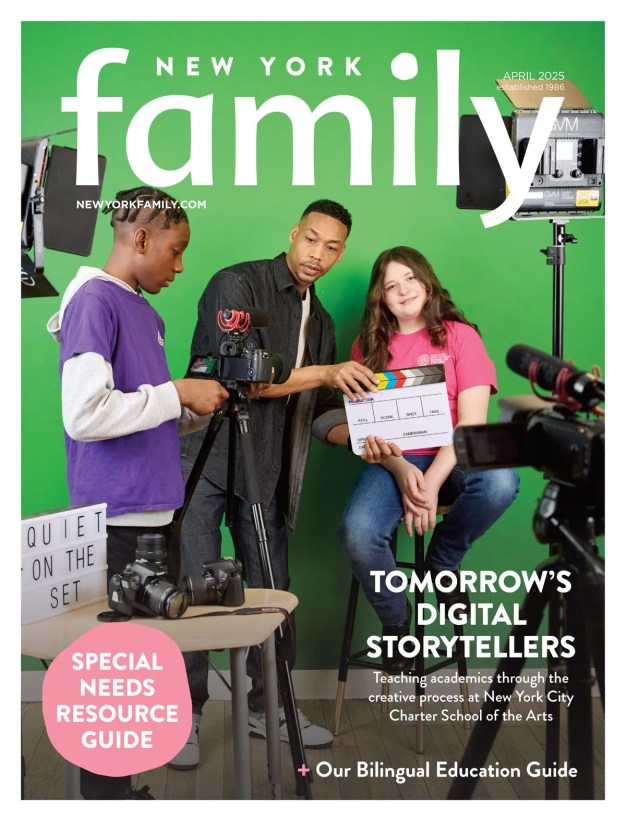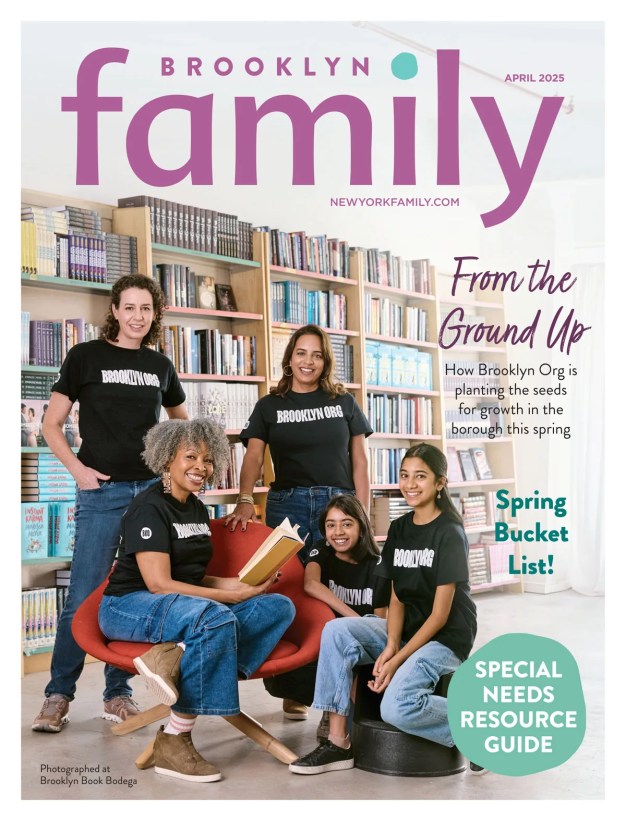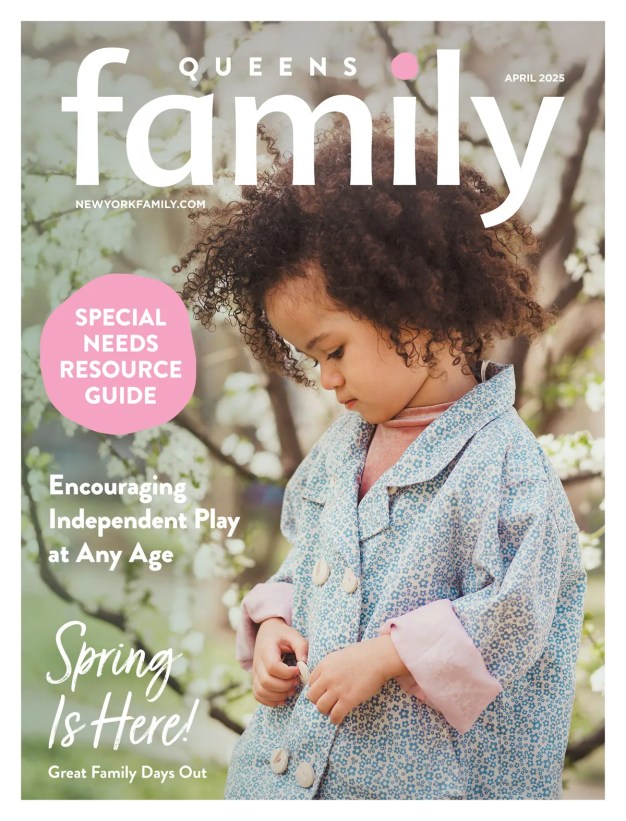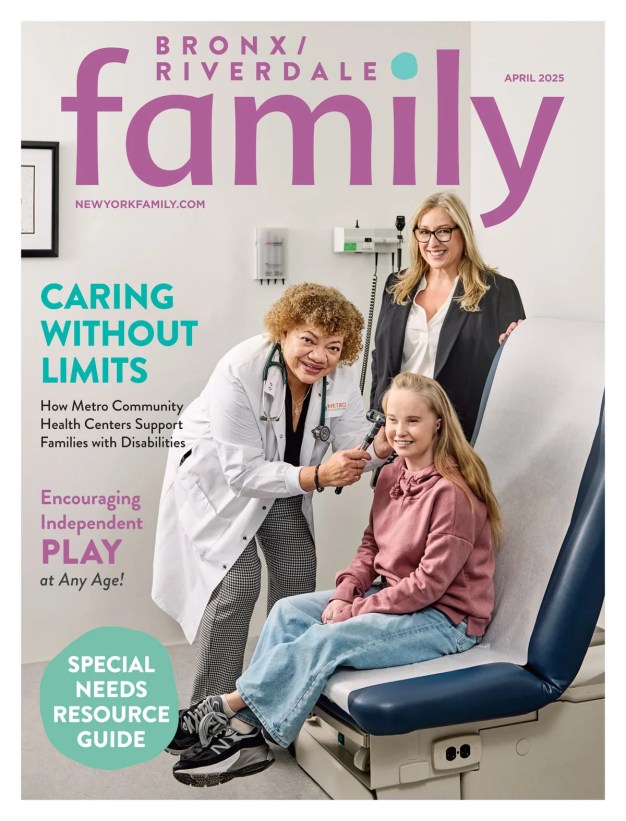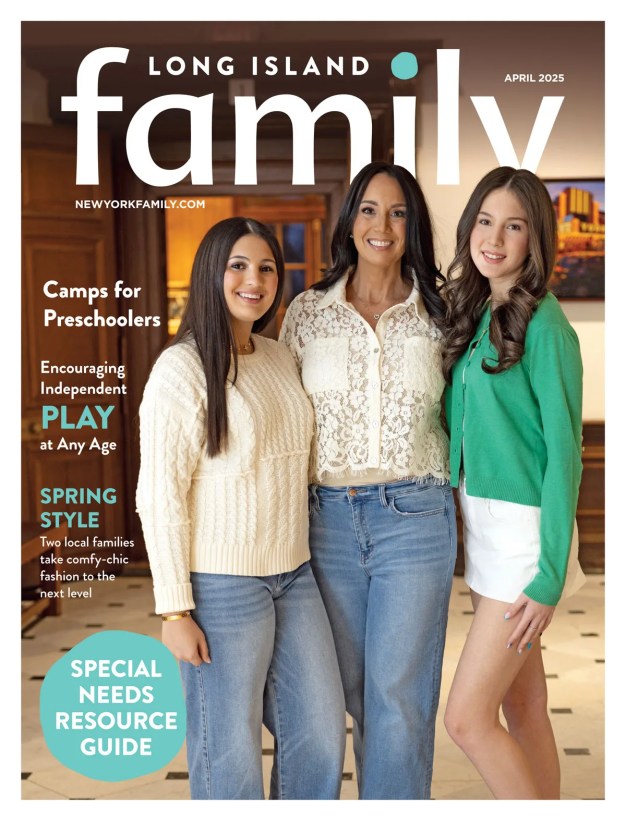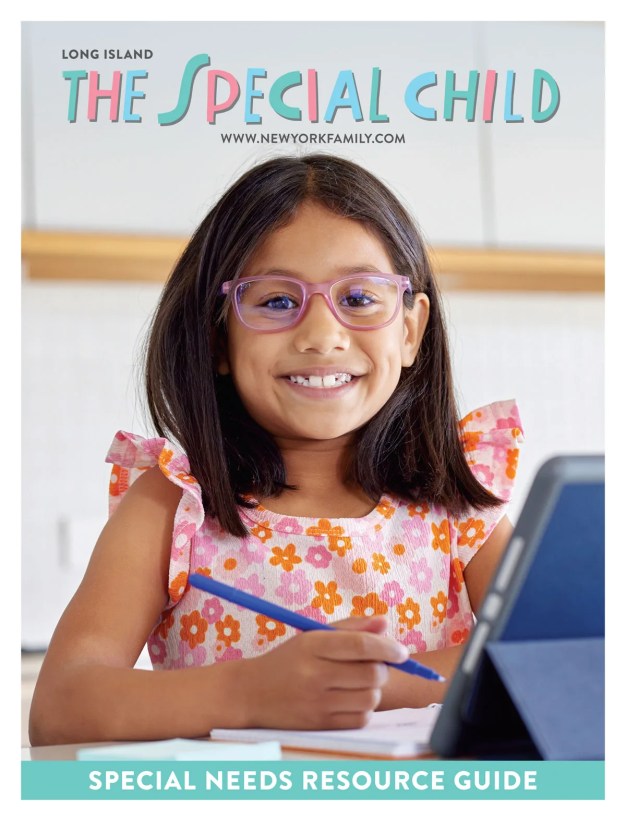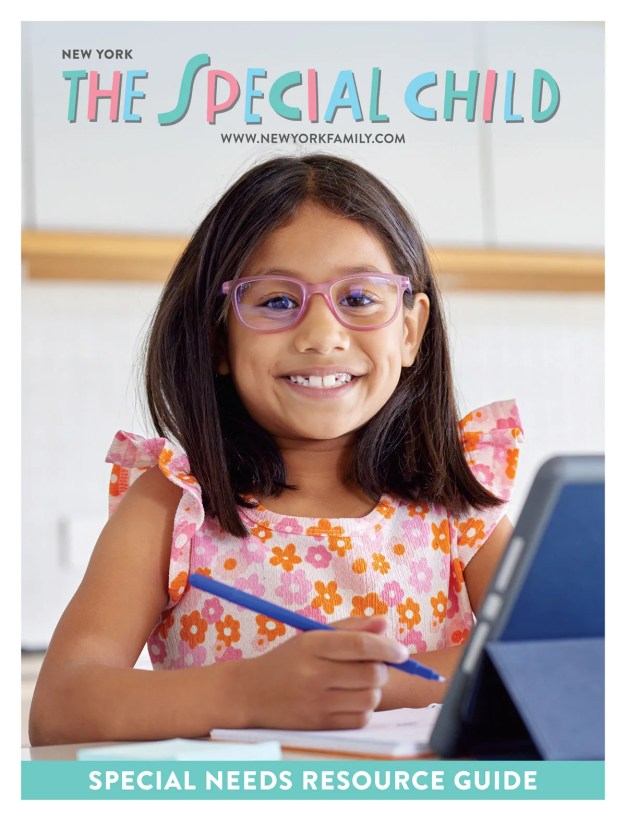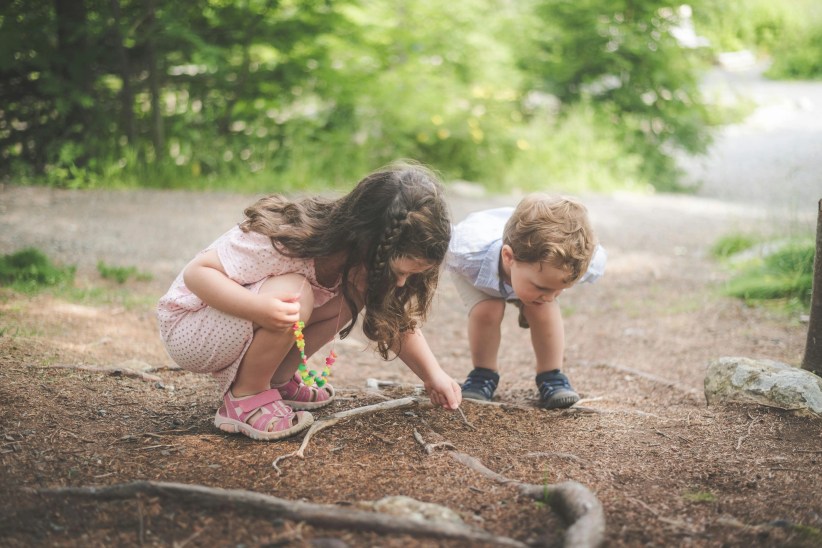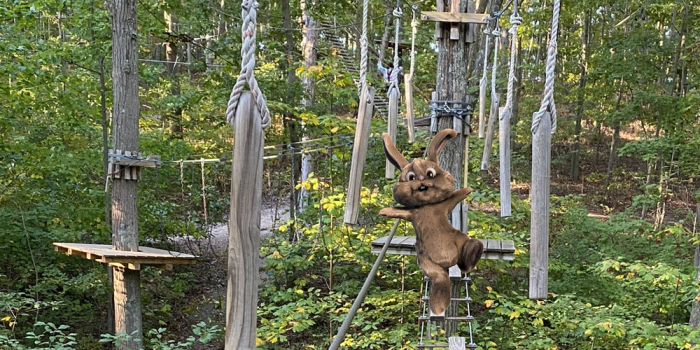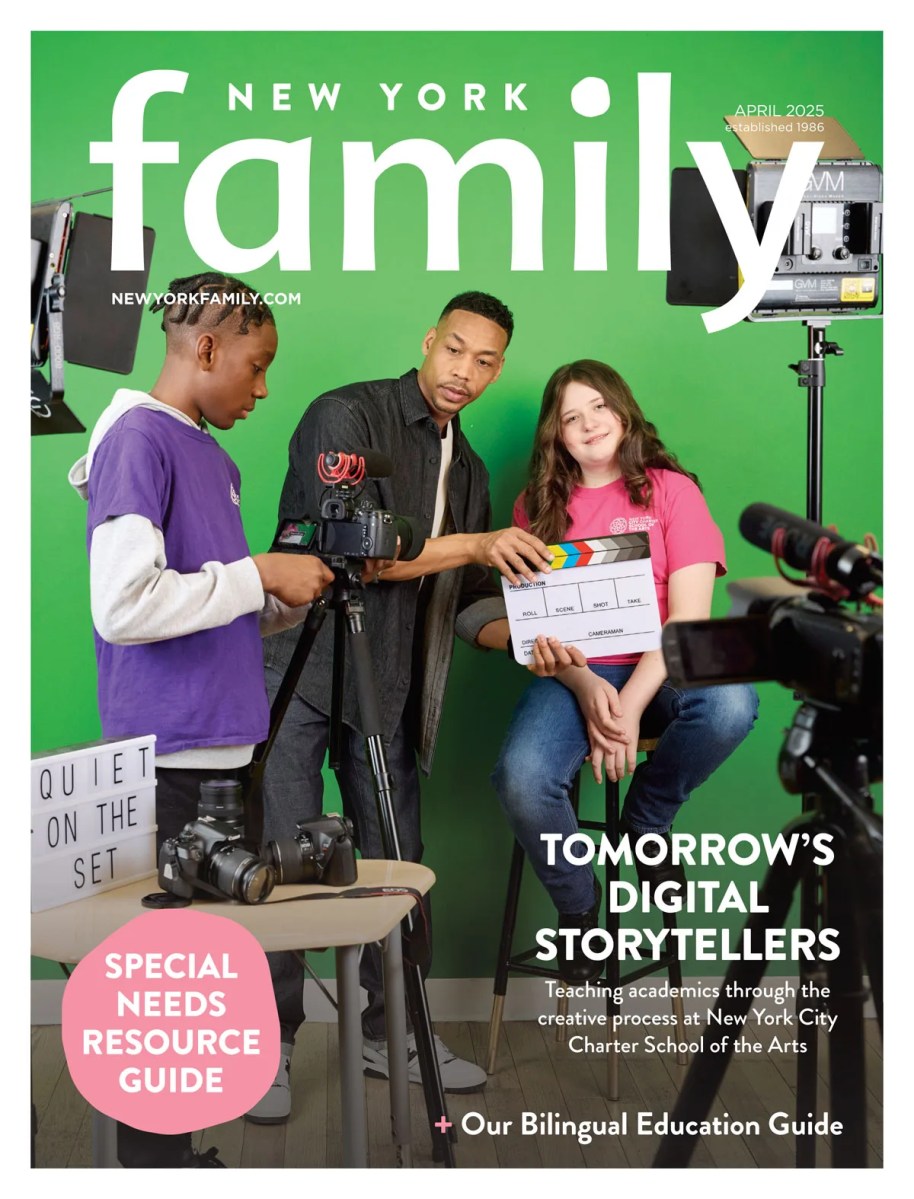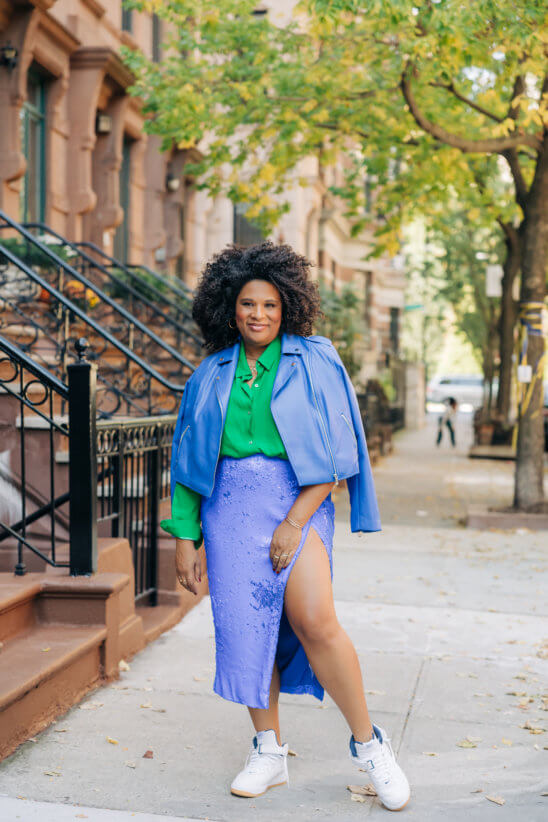
November Cover Julee Wilson is Shining Bright
Full disclosure: I’ve known Julee Wilson since 2007, when we were both young, hard-working magazine editors trying to find our way in the fashion industry. I liked her from the day we met. She was outgoing, confident as hell, really funny, and always kept it real. She had a magnetism to her that drew you in—when she told a story, people hung on every word. I need to tell you before I go any further with this piece that she is the same exact way today, 15 years later. Except today she has two beautiful sons (Orion, 8, and Nadir, 21 months), a rockstar of a husband, and almost 72K followers on Instagram—who also hang on her every word. She still keeps it real, sharing the highs and lows of her life with an openness and vulnerability that Instagram could frankly use more of (everything from pep talks she gives to herself when she’s having a bad day, to being open about her diastasis recti and how she has not “snapped back” after having kids). Since those days of hustling as a young editor, Julee left fashion behind and has become a force in the beauty industry, making a major impact from the inside out (she counts publishing a story in Cosmo about how Black women interact with beauty as one of her proudest moments). You can also rely on her to introduce you to all the other smart, successful women in her life (and there are many) because she believes in lifting women up, and helping them to shine their light. Oh and let’s not forget, her feed is full of photos of her absolutely adorable boys (if you haven’t clicked on the hashtag #wombfire yet, do yourself a favor). So, dear reader, do you now understand why I’ve been manifesting this cover story for so long? I knew you would love her. I knew you would learn from her. And, most of all, I knew you would want to know her. Read on to hear about how she got her start as a young Black woman in publishing, her incredible rise to beauty editor powerhouse, and why she never lets a day go by without being grateful for the family she came from and the family she has now.
CP: Can you tell readers a little bit about yourself, and how you ended up where you are today?
JW: So my professional journey kind of actually started in college, when I decided I wanted to write fashion. That was when I was laser focused on getting the type of experience I needed in order to break into this industry. I knew being a young Black woman that I didn’t see much of myself in the industry, so I knew I had to start early. Most people do internships between their junior and senior years, I started interning after my freshman year. I interned at Bergdorf Goodman, because the father of one of the girls who went to my high school was a senior vice president there. That was my first “in”. After that experience I interned at Vibe magazine, then, between my junior and senior year, I got into the Condé Nast Internship Program and was at Condé Nast Traveler magazine. It was exciting because I was able to write so I had bylines. I was able to go to the newsstand and pick up the magazines and see my name in print, which was crazy. Later I found my full-time job at Real Simple, and then that started my real journey. I stayed there for six and a half years. It was great. I feel like it was such a strong brand during that time. The magazine was thick, they had international editions. It was so sick. I was traveling, I did media training, I was able to go on the Today Show. I’m like, 24 years old going on the Today Show doing segments, it was amazing. They really trusted me. But by the time 2011 rolled around magazines were folding and keeping their websites it was very clear that digital was about to take over. HuffPost reached out to me about Black Voices and I was like, why not? I got the job and it was a turning point. I’ve had very challenging jobs before, but I always say I went from a monthly to a minutely. I used to work on three to four stories a month. Now I was writing three to four stories a day. Writing three to four fashion stories a day was a lot, so when they added beauty it really helped diversify my content and my voice and I just started to fall in love with beauty. It feels more universal. It feels like an industry that I can really make a difference in. But the real turning point in my career was when Essence reached out to me to write a cover story.
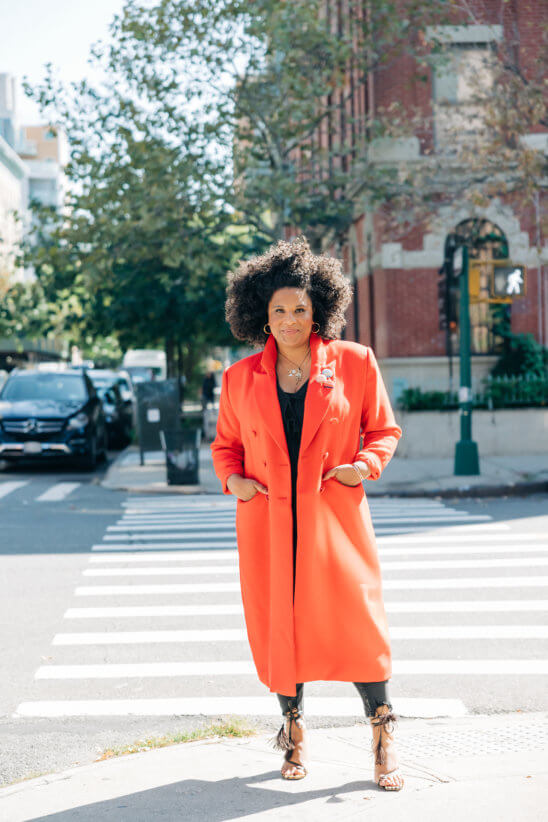
CP: You know you have reached some level of respect and success when people start reaching out to you to do things. Tell me about that.
JW: Honestly, looking back, HuffPost allowed me to really create a lane when talking about diversity and inclusion. I wasn’t writing about diversity and inclusion at Real Simple, I was writing about cardigans and rain boots. I didn’t have the platform to be, like, Black Julee there. I think that they appreciated my diversity and my viewpoint, but it wasn’t the platform to be having those conversations. When I got to HuffPost, which is truly a news media company, it was more like, tell it like it is, tell the news. Vogue is doing blackface, we have to write about that. I was able to kind of talk my shit—from the outside. And I ended up becoming a real voice people would reach out to when there was a diversity and inclusion angle, whether it was good or bad. And so that was a really cool moment to become an authority in that space. The other thing is, there is a very small black population within publishing, we all know each other. Don’t get me wrong, we’re not all best friends, there are, you know, cliques within the community. But I do feel like we all, at the very least, there’s a level of respect because there are so few of us in the industry. That said, I obviously knew the folks at Essence, so when they reached out to me to write the cover story, it was because one, they’d seen my work and they knew me. But two, they also knew that the cover story was about Misty Copeland becoming the first Black principal ballerina named at American Ballet Theatre. That was history.
CP: And that felt like it was your lane at the time.
JW: It was. I also think they knew Misty and I were friends. They knew it would be a good interview. And so I was floored. You know, the Essence’s and the Ebony’s of the world, those are our magazines. There’s always this reverence and respect for them. I didn’t think that I could really write a cover story at that point in my career, but I was not going to let the opportunity pass. This was not only Essence, it was not only Misty, who is a queen, and a friend, but it was also a moment in history. And so I was like, I have to do this. I went to my boss, Arianna [Huffington] but she just didn’t see it as something that was as important as I knew it was, and she said, “No, we’re gonna pass on this”. I went home, I cried, I was so upset. I didn’t know what I was going to do. My husband was like, “You’re gonna tell them that you’re writing the story, and that if this means you lose your job, then so be it. It’s too important for you to pass on. And you’re so talented and dope, Julee, you’ll find another job.” But, you know, we’re taught to be so loyal. We have to, like, respect that if they say no, that’s a no. But this was too magical of an opportunity, so I put on my big girl panties, I went back in and told them I really need to do this and if it means me losing my job, then I’m gonna have to because I can’t say no. And the response was, “Oh, no, no, I mean, if it’s that important to you, then stay, write it. We just didn’t know it was that important.”
CP: I imagine that was a major life lesson for you. What did you learn in that moment?
JW: I learned my worth. I don’t think it’s a one time thing, it’s a continuous thing that you start learning your worth. But that was the first time that I truly believed that I believed in myself. You know what I’m saying? You’re always like, I believe in myself, I can do this. Like, you’re gonna go on television, you’re gonna write this story. But there’s always that voice that says you might fail. But this time, this was the first time I was like, oh, no, I’m dope, I know I’m great. This just validated that greatness that they’re not going to let me walk out the door because I stood up for myself and I wanted this opportunity. That was really the true turning point in my career because one, it showed me my worth. Two, it gave me this really amazing opportunity to be a cover story writer. And it really charted my eventual journey to Essence. The story came out and it was so beautiful. So exciting. I think six months after I wrote the story Essence called. And mind you this is very important, I tell people this all the time, I applied to work at Essence no less than two other times. So after writing that cover story, six months later they offered me a job which was another huge blessing and mind-blowing moment because the place that rejected me now wants me. I became Digital Fashion and Beauty Director. So going to this heritage brand that I love was amazing. Then when the fashion and beauty director for the magazine left, they gave me both digital and print. After two years they promoted me to Global Beauty Director.
CP: I feel like timing is very important to all this. From my lens, as someone who was your friend and who followed your career, I feel like there were important things happening in beauty at this time that coincided with you coming up and becoming more influential.
JW: Yeah, I mean, when I was at HuffPost part of creating my lane was becoming a real expert in the diversity and inclusion world. I can remember clearly writing all of these stories around Trayvon Martin, the first resurrection of the Black Lives Matter movement. Everyone tries to act like this is a brand new thing but we’ve been fighting for our freedom for centuries. It just comes with different names, like back in the 50’s and 60’s it was Freedom Riders and civil rights workers, and now it’s Black Lives Matter. There was this resurgence of going back to natural hair, the natural hair movement was starting to happen, which honestly was very revolutionary for me too. Because coming from Real Simple I was straightening my hair all the time to blend in and make sure that I could just do my job and not have my appearance create any type of friction or tension.
CP: I’ll never forget something you said to me back then: “Don’t let anyone dim your light” or “They will not dim my light.” And I think for you that was really it.
JW: I mean, look, people get threatened by what you have to offer. And to me, everyone has magical talents and traits. I’m just here to show mine off, you show yours off too. But whatever relationships I had or personality that I had that was exciting, or drew people or whatever, they would see it as some type of indictment on their own light. And I’m like, that’s got nothing to do with you. That’s just me being Julee. But I do stand by that today: Don’t let anyone dim your light. I used to dim my own light to make others around me feel comfortable. I have learned over the years—and I wish I had learned it sooner—that I am not responsible for how those people feel when I’m shining my light. And whatever consequences come from that, I just have to ride with it. If that means them being, you know, cruel or bullying me and passive aggressive, I just have to eat it and know that what’s to come is better. Because yeah, it takes a lot of energy, stressed anxiety to dim your own light—while also having their hand on the knob dimming you.
CP: I feel like when you were at Essence is when you started to really come into your brand on Instagram, and your following grew. You started to hone in on what it is you want to say on your platform and the messages that you want to bring across. One of the things that always came through is gratitude. And you still speak a lot about gratitude on your platform. I would love to hear what made you start talking about that so openly, and what it meant to you.
JW: I think it’s a function of being blessed enough to be in such rarefied spaces. I don’t take for granted that I am a Black girl, who got to have an amazing family and home in Amish Country, Pennsylvania, went to boarding school, went to a private university on a track scholarship. To have an amazing genius sister and to have a special needs brother. I just go back to that because all of those things shape how I feel about life and gratitude today, because you can’t not experience those things and not be grateful. Having my brother in my life is so huge. It’s why I wear his pins. He’s doing amazing in life, but he does not have the life that we all get to live, right? And my father came from nothing in North Carolina. My father picked cotton, literally picked cotton. My dad. Not my great, great, great grandfather, my father picked cotton at workcamps in North Carolina. He was able to get an education, go to college, play in the NFL. You can’t tell me that those stories, those experiences, don’t make you extra grateful. Did he ever think working on a cotton field that one day he would make it into the NFL? Have a beautiful family? Send them to private schools? His kid is now showing up on the Today Show, his other daughter has a master’s degree in speech pathology, and his special needs son is a master weaver. And so I look at my family, and they’re why I hustle. So yeah, it’s instilled not only gratitude, but a work ethic I’m really proud of. And I just don’t take any of the things that I do for granted, even the little things. I need to know that my legacy, when everything is said and done, when you Google my name, some dope shit pops up.
CP: What kind of response do you get from your community when you talk about gratitude?
JW: Honestly, the people love it. I just try to keep it so real, on my Instagram or wherever. Because I do think that there is this illusion that this life is just peachy keen, it’s fine, and you’re just ballin’, and the money’s flowing, and you’ve got this new bag—most of the clothes and bags and shoes I have, they were gifted. That’s a great perk. That’s an amazing perk to be in this industry where people thank you with things. Would I like to be thanked with money so that I can buy a home someday? Yes. But that’s what this industry was built on, perks. And so yes, I have so many great perks. But I think people don’t understand, like when I posted a picture of me jumping on a bed with Tracee Ellis Ross—which is one of the most iconic moments of my career—is one, the prep of figuring out what I’m going to ask this woman, the nerve it takes to sit down and talk to her, and all the work that goes in afterwards.You think you just like go home and have a drink and talk to your bestie on the phone that you just got to hang out with Tracee Ellis Ross? No. That interview needs to be transcribed. I need to sit over it. I need to pour over it. Do you know the anguish that’s going through my mind thinking about how I’m going to…because not only was it for the podcast, but I also wrote a cover story for Essence with that interview.
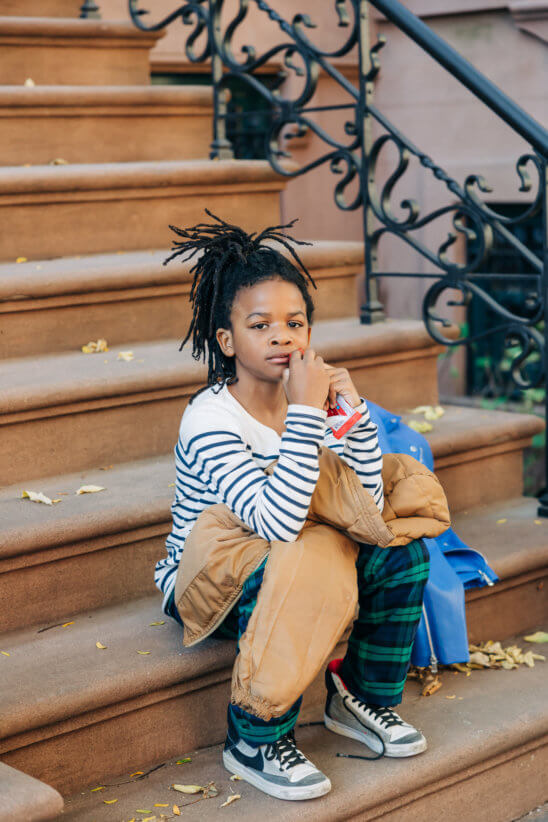
CP: So people see this extraordinary moment that you’re having in your career but they don’t see all the hard work that surrounds it—including being a mom.
JW: I mean, it’s hard. It’s hard. I don’t even know, it’s just hard. And every other mother knows. I don’t try to make myself seem like I’m some extraordinary example, like, other people are dealing with this too. And honestly, that gives me some type of comfort knowing that every mother I pass on the street is probably dealing with the same, trying to juggle it all. Trying to work, trying to make sure their kid feels loved and seen and all of those things. But it’s, it’s hard. And honestly, the thing that makes me feel like I can do it is my husband, period. I mean, we have a village, don’t get me wrong, my mother-in-law’s five blocks away. We have a cousin who who comes down if we want to go out for a date night. But honestly it’s Rahsaan because he has a more flexible work schedule. He’s always the one who’s like, “I got it”. And I know that probably weighs on him, and it’s stressful, but he never makes me feel bad or guilty around the work that I have to do. He knows one, that it’s my purpose, but also that it’s for all of us. It’s not just for me. It’s for the family, you know, and sometimes I’m sure that makes more sense than others, like when I’m staying up late to write a story. And sometimes I think it’s more like, “Really, do you need to go to the South of France?” And, I do. It is important, it is relationships. It’s part of the job. So yeah, I’m sure it’s a little harder pill to swallow when it’s like, “I’ll be back in five days, I’m going to be at Hotel du Cap having a cocktail on the Mediterranean.” But he gets it. And again, he never makes me feel bad about it. And in fact, he pushes me to be greater, and asks, “What can I do to make sure that you’re being the best in the biz?” It’s so important to have a supportive partner in life. I literally could not do this without him. Literally, it just wouldn’t work. Like, even yesterday, going to the Today Show. Nadir started daycare this week, Orion’s going to school, so he literally has to pack both of their lunches, dress them, bring them to drop off. We could have tagged teamed that in a normal circumstance, but he never makes me feel bad about it. I think he feels important in those ways, that he can be the rock of the situation. I also think he’s just really proud of me, which is great, too.
CP: You mentioned Cosmo. So you’re at Essence, you have this incredible job at this legendary brand that you’ve looked up to for so many years, if not your whole life. And then what happened? Cosmo is also a legendary brand. So what was that like?
JW: I had gotten to a point at Essence where I felt like I’d done the things. I created a multimillion dollar franchise called Dope Stuff On My Desk. I hosted a podcast that became Webby Award honored. I’d written several cover stories while I was there. I had helmed the Essence Beauty Carnival. And so I think I needed to dream another dream. Hearst reached out, this was a reach out situation again, which I was still in shock about. It had happened now a few times, but even years later I never became jaded about being reached out to. I went in for an interview and really fell in love with Jess Pels, the editor in chief. And like, it just felt right. And it felt like the right time to dream that other dream. My first day at Cosmo was April 1, 2020. So I literally did not see any of my team or my boss for months. Like it was just a Zoom situation. I got pregnant near the middle of April, not planned, just one quarantine night. And here we are, the pandemic hits, new job, new baby, it was just all aligned with the stars. And I do believe…I had a lot of trouble having miscarriages between Orion and Nadir. I do believe I needed to be in a less stressful work environment, and to have the comfort of being home and not having to run around town, to the events, to the office. I was able to sit here in the safety of my home surrounded by my husband and Orion, and cook this baby.
CP: Do you mind me asking how many miscarriages you have?
JW: I had three.
CP: What was that like?
JW: Oh, it was terrible. I could get pregnant, I couldn’t stay pregnant. But I knew I was so stressed out and I was fighting for this idea of what I thought my career should be and what people wanted me to be. But my body was like, we can’t do this. I was depressed. I remember getting up in the morning really early to try to meditate or calm myself or whatever, so I could get through the day after each one of these miscarriages, and being in this living room and screaming into a couch pillow not to wake Orion and Rahsaan. I was so upset. And I was so angry that I could not bring this child to fruition.
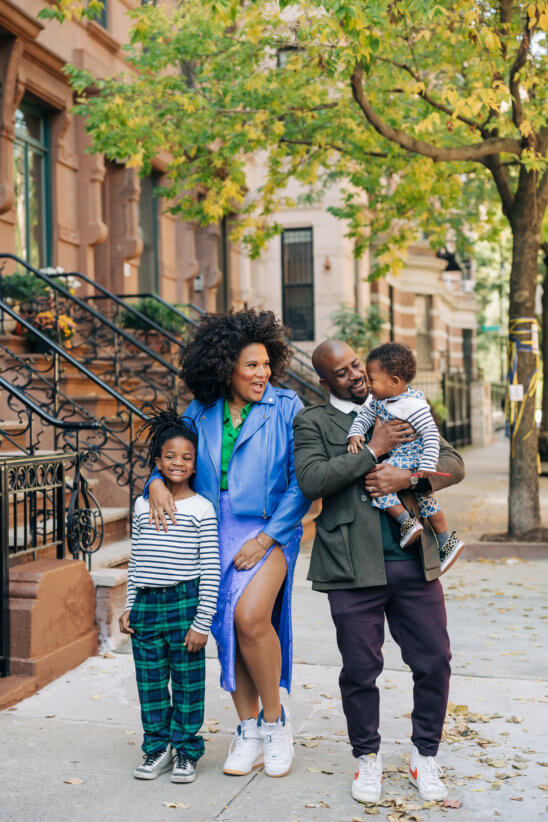
CP: So you guys wanted that second child, you were trying for him?
JW: Yes. And I think a lot of people don’t understand that not only is the mother going through a lot, anguished and frustrated and sad and all of those things, but my husband was going through it too. He was getting excited every time we got pregnant and then being devastated when we weren’t. I had my last miscarriage in October 2019. We said we were going to stop trying for a while, it was just too stressful. But my husband actually was like, “I think we’re fine. We have Orion.” So I also felt very selfish. That was also part of my anguish and trying to deal with my mental health and depression around it. I have friends who literally were having trouble getting pregnant with their first child, right? And I’m sitting here with a whole child who I love and who I was pulling closer, because I was just like, I’m so grateful for you. But here I am crying because I can’t have a second baby. I felt guilty that I was upset about having these miscarriages when I already have a child, like who am I to be upset about that? Which you can be, and I’ve learned that, but it’s so hard to express that to friends who don’t even have kids. But here I am praying for my friend to get pregnant because they’ve been trying for years, and I’m crying about the fact that I can’t get my second kid. So it’s a lot. My husband thought maybe we just have Orion and that’s it. But I just felt like there’s a baby for us. It took the pandemic, it took the world to stop.
CP: Well, the only way you would stop is if the world stopped.
JW: Yes! I think my body was finally like, you needed to sit the fuck down, Julee. You need to sit down, you need to not be running around doing the things, hopping on planes, stressing about deadlines, like, all of those things.
CP: So tell me about being a Black beauty director at a legendary brand that is not maybe known for its coverage of diversity. And tell me about the importance for you of your impact there and your mission.
JW: I first got hired…this is another function of age, and again, the journey of continuing to know your worth, right? When I went into that interview with Cosmo, I was very self assured and very aware of who I am, what I bring to the table. I never was like that in interviews before. It was always like, what do they want? What do they want to hear? Like, how do you want me to fit into this box? And I’m telling you every year that has gone by, I’ve been more like, this is who I am. I literally remember saying this to Jess Pels, in that interview. I was like, “I am a Black woman, but my superpower is the fact that I tell stories from that lens. And that I can know about everyone’s beauty, too.” Because I’ve had to know about everyone’s beauty. My white counterparts have not had to learn about me, they can be like, oh, that’s a Black girl thing. I have to write about me, I have to write about you, I have to write about our Asian brothers and sisters. I’m a true expert in this thing. And the fact that I tell stories through my lens, a lot of my story ideas and the things I want to talk about are Black, Black, blackity, Black. And I can’t hide that. And in fact, I don’t want to, I actually want it to be celebrated. So if you are down for that, and that is something that you see in Cosmo’s future, then I’m your girl. If it’s not, no hard feelings. But that is the space I need to live in, and if that is not something you’re down for, I will not take it personally, but this partnership won’t work out. And she was just like, “No, I love this!” And speaking to your light dimmer thing, Cris, I hand to God, I literally said to her in the interview, I was like, “I’ve worked for a lot of light dimmers. That’s my question to you, how do you interact with your talent and your leaders on staff? Are you someone that uplifts them and pushes them to greater things? Are you happy when you have stars on your team?” I was like, “I’m the type of manager that I want stars. It only makes me look better. I’m not here to dim people’s lights, I’m here to make them better.” We literally had this conversation. And she was like, “No, I love that. I’m not a light dimmer. I want everyone to be great.” And she’s proven that to me, she has pushed me in every way and has allowed me space and grace to be me, so I’m so grateful for that. I wrote a whole story about how Black women interact with beauty and how the world should take note. I’ve written about headscarves and bonnets.
CP: I was gonna bring up the bonnet story!
JW: Girl, that’s probably, next to my feature around how Black women interact with beauty, those are my two proudest stories.
CP: A few months ago, I wore a shower cap in the shower and when I put it on my daughter said, “Mama, I like your bonnet.” And I was so happy that she knew that, even though it wasn’t a bonnet. Because I just think, even for me to see that story in Cosmo, like…I never knew what a bonnet was before!
JW: Why would you?
CP: But I should!
JW: Yes you should, and everyone should! It’s so fascinating, there are things that I do not interact with, like hairspray. But do I know about it? Do I know its power? Do I know how it’s used? I don’t necessarily need hairspray, but am I fascinated that there are people who do need it? Sure. It’s storytelling at its core. And I remember having that conversation with her and being like, “So there’s this beauty ritual that most Black and brown people have every night. Every night.” If white women were having a whole beauty ritual every night, it would be a billion dollar industry. I said, “There’s no market for it, other than the markets that we have created for ourselves so that we can have these products.” And her mind was blown. We did the story and the fact that we did it with these beautiful illustrations, people were in my DMs like crazy. Can this be a poster? This is such beautiful art. I put this poster up in my bathroom. I was just so proud. If I can tell these stories because I’m a Black woman, that’s great. If you have an Indigenous person on staff, they can tell you about stories that you might not even know about. Those are the things that excite me. Like, who cares about a mascara story every single month? Give me something that is exciting and new and fabulous.
CP: So what’s next for you?
JW: A few months ago, I got a new job. I am now the executive director of BeautyUnited. My part-time job is being editor-at-large at Cosmo. I am very grateful for that. Cosmo made a way that I could stay but also run this non-profit. So the future is full and exciting! I get to still be an editor, I get to run a non-profit that I really, truly believe in. I have the freedom now to say, yes, no, maybe. Every day offers a new opportunity that I get to either say yes to and dream around, or say no, that’s not right for me right now. And even that feels magical.
CP: What’s your advice to someone who may be struggling with impostor syndrome and knowing their worth?
JW: Surround yourself with people that do know your worth and will constantly tell you in a real authentic way like, you can share your woes and your wells with them. And they will tell you the truth, they will be the battery in your back. They will tell you you’re being silly. Or they’ll tell you that, no, you’re right. Just a village of people that remind you of who you are. Whether that is a difficult conversation or a celebratory conversation. Also, don’t beat yourself up, don’t take yourself too seriously. And every year, know you’re going to get closer and closer to the ultimate you.
Follow Julee Wilson on instagram
@missjulee
